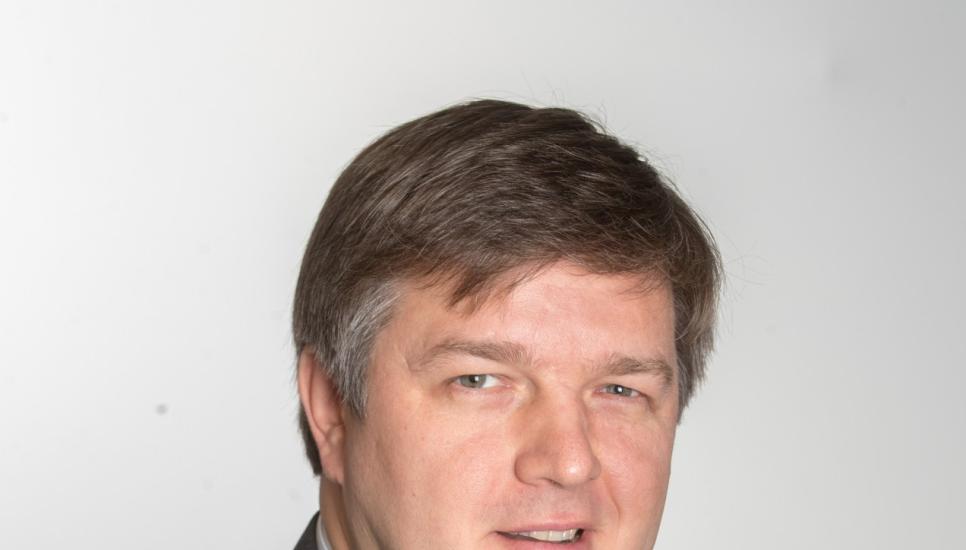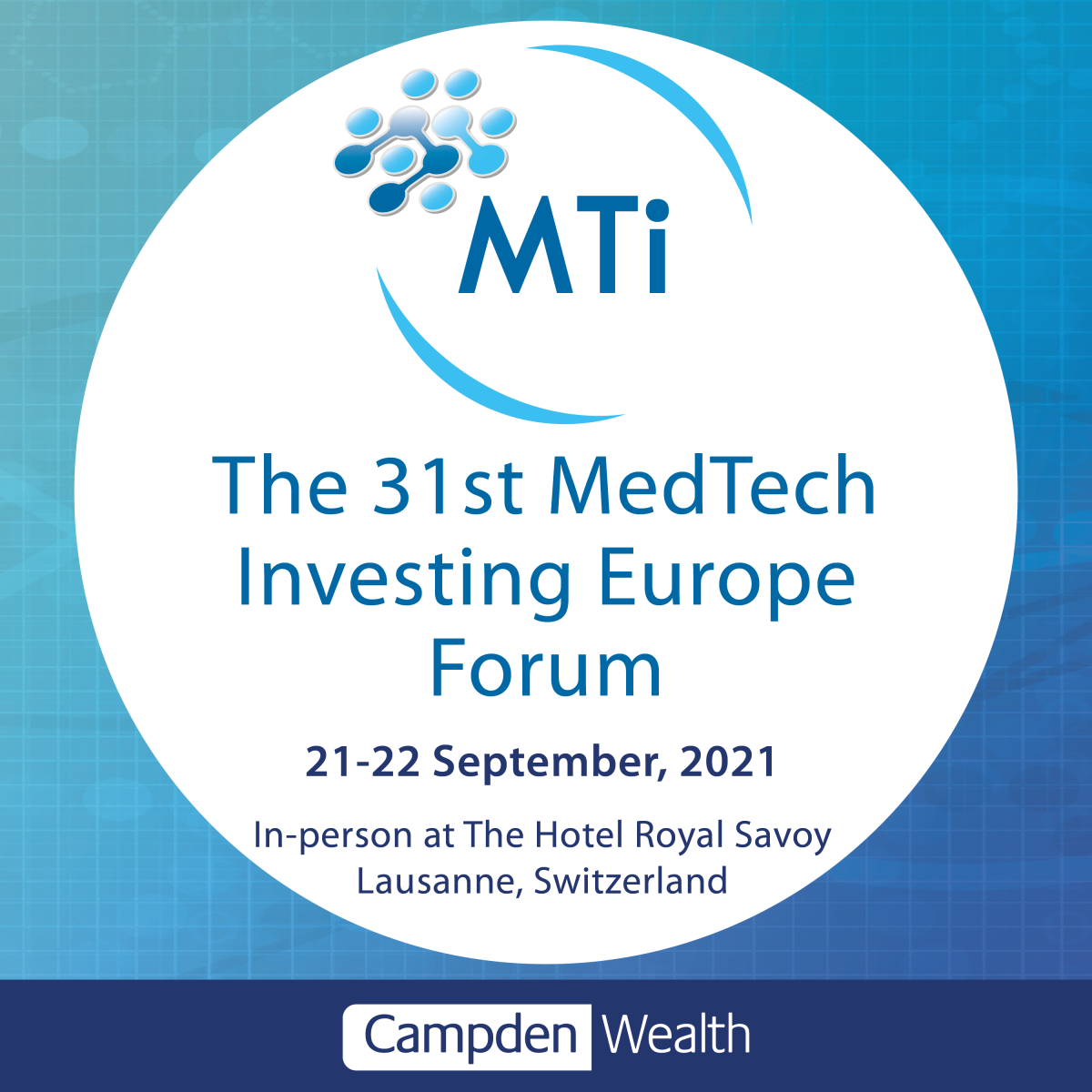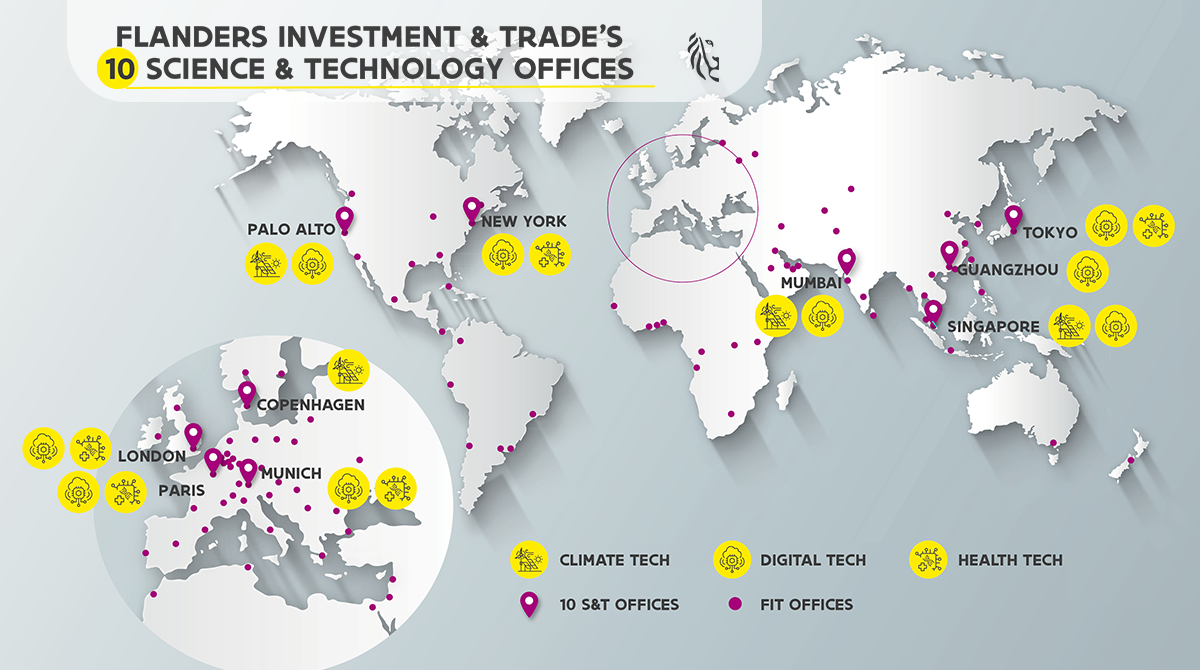Unravelling the mechanisms of how 'tech makes Flanders tick?

Say Flanders, think research and technology. Belgium’s northern region is a well-known beacon of innovation. Its companies, research centres and knowledge institutions are at the basis of ground-breaking solutions in niches like digital, health and climate tech.
Through its worldwide Science and Technology Offices, Flanders Investment and Trade helps Flanders build bridges of knowhow and innovative strength across the globe—and you can reap the rewards, too.
Heads up to all companies and organisations looking for an off-the-charts research and development environment to take their technological innovations further: Belgium’s northern region of Flanders is open for business and collaboration. To make sure the word gets out, Flanders Investment and Trade (FIT) has Science and Technology Offices in 10 innovative hotspots around the globe.
From there, FIT’s Science and Technology Counsellors connect technology-driven firms from Flanders with partners abroad while guiding technology-driven players to Flanders, where they reap the rewards of the region’s supportive R&D ecosystem. The goal? To create innovative tech synergies that can change the world.
Three ways in which Flanders helps shape a healthier world through technology
FIT’s technology counsellors focus on three technological domains: digital, health and climate tech. Those niches can grow and prosper in Flanders due to favourable conditions, like a supportive government and a tight network of private companies and independent research centres that drive innovation forward.
1. Flanders has got IT: a frontrunning digital tech ecosystem
Flanders is a pioneer in high-tech industries such as broadband, wireless and satellite communication. The region also excels in digital niches such as micro- and nanotechnology, robotics, Internet of Things, cybersecurity and game development.
One such domain in particular, e-health, is a longstanding forte of Flanders. Numerous companies and research centres in the region collaborate on big data applications that enable personalised treatment, disease prevention and recovery at home.
What’s more, local e-health players join forces in sector-dedicated networks and research initiatives. Take the BlueHealth Innovation Center, for instance. This Antwerp-based organisation is supported by Microsoft and stimulates innovation and entrepreneurship at the intersection of technology and healthcare, helping e-health and other digital startups reach their full potential.
 2. Flanders puts the ‘heal’ in health tech
2. Flanders puts the ‘heal’ in health tech
From surgical robots to 3D-printed implants and organs: Flanders’ MedTech ecosystem is every bit revolutionary. In times where healthcare is transforming due to an ageing population and public budget pressure, the focus is shifting from curative to preventive and from one-fits-all to a personalised approach.
In this regard, Flanders enjoys world fame with imec. The strategic research centre uses its advanced chip scaling expertise and infrastructure to develop new technologies for many industries, including life sciences and health. Its track record includes—but is not limited to—work on pioneering healthtech applications such as:
• Disposable smart health patches for continuous remote patient monitoring
• Miniaturised lab-quality tests based on silicon-chip technology, with built-in connectivity (miDiagnostics)
• AI-based software that traces the origins of genetic disorders 20 times more accurately (eXtasy)
• A hypodermic sensor allowing continuous glucose monitoring for people with diabetes (Indigo Diabetes).
But it doesn’t end there. Digital players in Flanders also contribute expertise in data security, another crucial factor for the future of medical technology. Meanwhile, research centres are increasingly looking to cocreate with private businesses to develop, test and market new solutions. Spearhead cluster flanders.healthTech, for example, builds bridges between different players to boost collaboration on four main themes: personalised medicine, digital medicine, efficient healthcare and ground-breaking care innovations.
 3. Flanders’ climate tech puts environmental pressure in checkmate
3. Flanders’ climate tech puts environmental pressure in checkmate
Environmental technology and sustainability solutions have become a top priority across the globe.
With years of innovative expertise in the field, many companies and research centres in Flanders are the perfect partners to help you boost your sustainable business.
Although a geographically small region, Flanders is a global frontrunner in developing innovative cleantech applications across multiple fields—from energy to waste management. To highlight just a few proof points, the region ranks first worldwide in recycling packaging waste and generated more than 650 cleantech patents in 2010-20.
Over the years, Flanders has established itself as a cleantech growth accelerator, building up experience in the circular and biobased economy, smart energy and energy storage, sustainable chemistry and more. The driving force behind this is the region’s strong collaborative ecosystem: public and private players, innovative universities, sector organisations (like Cleantech Flanders) and dedicated research centres (like VITO) all come together to create solutions that contribute to a more sustainable and healthier world.
 Ready to innovate with peace of mind?
Ready to innovate with peace of mind?
Choosing Flanders means choosing innovation with peace of mind. You know in advance that you are entering a networked environment that breathes, embraces and takes innovation higher. Want to set up your operations in Flanders? Get in touch with one of our offices around the globe for advice and support.
Check out the contact page at www.investinflanders.com or reach out via invest@fitagency.be.
Sarcura (Austria) and imec (Flanders) advance gene and cell therapy together
In 2021, Austrian tech start-up Sarcura announced a collaboration with imec, aiming to move gene and cell therapy forward. Transformative cell therapies use a patient’s own living immune cells to attack malignant tissue and constitute a promising new cancer treatment. However, due to its diverse and individualised nature, cell therapy has long been a bottleneck for the biotech industry. That’s where Sarcura comes in. Sarcura is developing an instrument platform for the GMP manufacturing of autologous cell therapies.
 Together with imec (Flanders), the Austrian firm will work on an integrated, silicon photonics cytometer for automated cell separation. According to Daniela Buchmayr, chief executive and co-founder of Sarcura, industrialising this solution will open new opportunities for industrial cell processing. For imec, this partnership fits in well with its ambition to connect to the cell and gene therapy ecosystem, allowing the development of compact, high-throughput modules that can inspect every single cell and handle billions of cells.
Together with imec (Flanders), the Austrian firm will work on an integrated, silicon photonics cytometer for automated cell separation. According to Daniela Buchmayr, chief executive and co-founder of Sarcura, industrialising this solution will open new opportunities for industrial cell processing. For imec, this partnership fits in well with its ambition to connect to the cell and gene therapy ecosystem, allowing the development of compact, high-throughput modules that can inspect every single cell and handle billions of cells.







